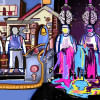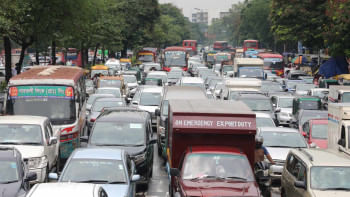Are we truly against discrimination?

"Students Against Discrimination" (SAD) sounded like a dream when we first heard about it. This "anti-discrimination" platform, comprising both male and female students, emerged in response to the widespread social and institutional discrimination faced by various groups within society, particularly students.
Since the July 2024 uprising and the subsequent ousting of the Awami League government, numerous bodies, platforms, and committees have been formed—either as extensions of SAD or as entirely separate entities. All these groups make similar promises: to root out discrimination and work for the betterment of the country. However, they share one glaring flaw—discrimination within their own ranks against women, private university students, and others, which is evident in the poor representation of these groups.
Looking at the central executive committee of SAD, 12 members were from Dhaka University, three from private universities, and seven from other educational institutions. Of the 22 committee members, only four were women. When the top leadership of the movement was announced, three of the four members hailed from Dhaka University and only one from Jahangirnagar University. The leadership included just one woman.
First, let us reflect on the crucial role women played in the July 2024 uprising. From the very beginning, women were at the forefront of the protests. They organised and led demonstrations, provided essential support such as food and medical aid, and used online platforms to raise awareness about the movement.
Their presence was particularly visible among university and high school students, who mobilised in large numbers to demand political change. Iconic images from the protests show women confronting police and political forces, armed with sticks and stones—a testament to their bravery and determination. Despite such exceptional displays of courage and resilience during the movement, most women have been sidelined in the post-uprising political landscape.
This marginalisation underscores an ongoing issue: women's contributions are often recognised during times of political struggle but overlooked when it comes to governance and decision-making. This remains a fundamental challenge to achieving gender equality in Bangladesh. In recent months, violence against women has not only persisted but escalated at an alarming rate.
While women were undeniably central to the uprising, their struggle for equal recognition and political empowerment continues. This is a stark reminder that participation in revolutionary movements does not always translate into lasting societal change.
Alongside these brave women, private university students also emerged as pivotal participants in the movement. Their significant role can be traced back to July 18, 2024, when they intensified the movement by taking to the streets and directly confronting government forces.
Although public university students initially led the protests, the involvement of private university students marked a turning point. When some student leaders were arrested or forced into hiding for their safety—when the movement, under pressure from law enforcers and the then government, appeared to be losing momentum—it was private university students who kept it alive and thriving.
Despite having less direct stake in government jobs compared to their public university counterparts, they rallied for political change, thus broadening the movement's support base.
Can we forget the day BRAC University students poured onto the streets to face law enforcers armed with lethal weapons, to protest the deaths of their fellow students—regardless of which university they were from? Can we forget how students of East West, North South, IUB, and others joined them?
Their involvement was key to expanding the protests' appeal, attracting a wider demographic, including urban youth and professionals. These students organised and participated in significant actions, including the Dhaka Blockade, helping to sustain momentum and escalate the protests.
Given this vital role, it is puzzling that a group of private university students felt compelled to protest the launch of the new independent body, Bangladesh Gonotantrik Chhatra Sangsad. Their protest aimed to highlight their exclusion. Does the word chhatra (student) lose its meaning when applied to them?
It is difficult—yet crucial—to be genuinely "anti-discrimination." Discrimination is pervasive, and often we are unaware that we are perpetuating it. However, when we ourselves are discriminated against, we are quick to label ourselves as "anti-discrimination" advocates.
If you judge or shame someone based on their race, appearance, religion, caste, class, or language, you are reinforcing discrimination—not fighting it. Can we truly claim to have moved beyond these biases, or is the real work still to be done?
For decades, society has failed to confront these issues with the seriousness they deserve. It is time to stop hiding behind labels and start looking inward. We must recognise our own shortcomings and take responsibility for the changes that need to happen within ourselves before we can hope to bring about transformation in the broader society.
The road ahead is one of deep reflection and significant social reform. True "anti-discrimination" efforts require more than simply calling out injustice—they demand a genuine commitment to addressing the prejudices we each carry. We must not only acknowledge the exclusion of certain groups from political spaces but also challenge the deeply ingrained biases in our everyday interactions.
It is time to set aside our hypocrisy and take meaningful steps towards a more inclusive and just society, where the voices of all are heard, respected, and valued in shaping the future of the country.
Naziba Basher is a journalist at The Daily Star.
Views expressed in this article are the author's own.
Follow The Daily Star Opinion on Facebook for the latest opinions, commentaries and analyses by experts and professionals. To contribute your article or letter to The Daily Star Opinion, see our guidelines for submission.

 For all latest news, follow The Daily Star's Google News channel.
For all latest news, follow The Daily Star's Google News channel. 










Comments